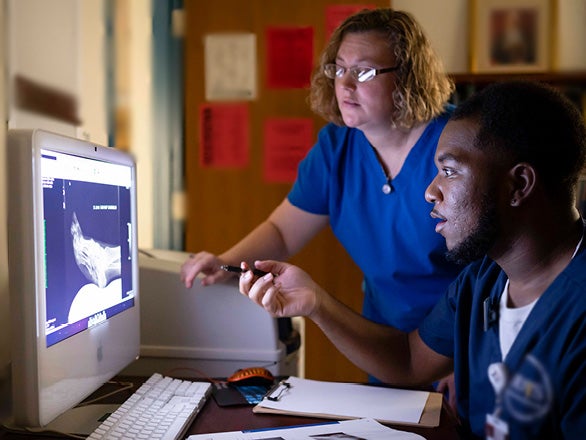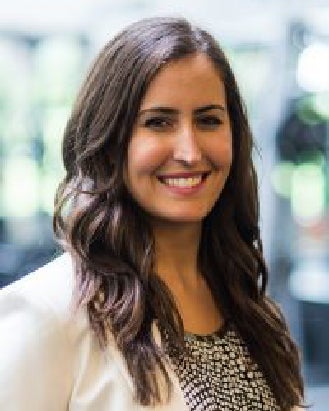Prevent injury, promote healing and support safe and thriving athletic programs as an athletic trainer.
Locations
- Armstrong Campus (In Person)
Why Earn a Master’s Degree in Athletic Training?
- Choose a rewarding career path in a rapidly growing field.
- Graduate ready to sit for the Board of Certification (BOC) exam to earn Athletic Training Certification (ATC) and state licensure.
- Assistantship positions available to help fund your studies.
- 60 credit hours to completion.
Support others as they engage in sports and exercise, using your expertise to prevent injuries and restore optimal function through the latest research-backed approaches.
In Georgia Southern University’s rigorous Master of Science (MS) in Athletic Training program, you’ll learn from experienced faculty and seasoned professionals both inside and outside of the classroom and complement your study of theory with an abundance of clinical observation and practice. Beginning with your first semester, we immerse you in clinical and sports-related settings, from Georgia Southern Athletics to local high schools to regional healthcare facilities. During your assignments, you’ll help athletes train better, including tracking their performance and developing injury-prevention strategies.
By the end of the program, prepare to take the Board of Certification exam and enter the profession, joining Georgia Southern graduates who have found positions with colleges, schools and clinics throughout the region and beyond.
Request More Information
What Can You Do With a Master’s in Athletic Training?
Upon completion of the master’s in athletic training program, you’ll prepare to take the Board of Certification (BOC) exam to become a certified athletic trainer. Once in the field, you’ll use your broad understanding of health and human physiology to support persons involved in athletic activity of all kinds at every level, from kids to professionals to seniors.
Where our graduates work:
- After-school programs
- Clinics
- College and university sports programs
- Hospitals
- K-12 schools
- Physical therapy practices
- Strength and conditioning programs
What our graduates do:
- Athletic consultant
- Athletic trainer
- Athletics director
- Personal trainer
What You’ll Learn
Build knowledge in each of the key areas of athletic training practice:
- Injury and illness prevention
- Clinical evaluation and diagnosis
- Immediate and emergency care
- Therapeutic interventions
- Professionalism and ethics
Beginning with foundational courses in research methods, basic clinical techniques and emergency care, you’ll progress to an in-depth consideration of evaluation and treatment for specific areas of the body.
Alongside classroom learning, you’ll broaden your understanding of both athletic training and other allied health professions through clinical assignments. Each semester, you’ll practice improving physical performance and injury prevention through extensive hands-on experience in a variety of settings, including a full-time placement in your final semester.
See the CurriculumClinical Education
Through clinical rotations every semester and an immersive, full-time placement in your final year, gain extensive experience both observing and offering care in diverse athletic training settings.

Want to Learn More?
Explore essential information about our MS in Athletic Training program, including application details, accreditation status, and licensing disclosures. Gain insight into the program’s credibility and requirements to help you start your journey toward success with the knowledge you need.
Applicants for the MS in Athletic Training program must hold a bachelor’s degree from a regionally accredited institution with a minimum cumulative GPA of 3.0 (on a 4.0 scale). In addition, you must have completed the following prerequisite courses (or approved, similar courses) with a grade of C or better:
- Biology (BIOL 1103 or similar)
- Chemistry (CHEM 1211 or similar)
- Anatomy and Physiology I & 2 (KINS 2531 & KINS 2532)
- Physics (PHYS 1111)
- Biomechanics (KINS 3543)
- Psychology (PSYC 1101)
- Medical Terminology (HLTH 2510)
- Research Methods (KINS 3130)
- Nutrition (NTFS 2530)
- Structural Kinesiology (KINS 3541)
- Physiological Aspects of Exercise (KINS 3542)
- One additional psychology course, such as:
- Abnormal Psychology (PSYC 3101) or
- Lifespan Psychology (PSYC 3103)
To apply, please submit:
- An online application through the Athletic Training Centralized Application System.
- Official transcripts for all prior college-level work.
- Three letters of reference.
- A personal statement describing your professional and academic background, career goals and reasons for seeking admission to the program at Georgia Southern.
- Documentation of at least 100 observation hours with a Certified Athletic Trainer (ATC).
- Official GRE scores (minimum 280, writing 3.5).
- Proof of University-required immunizations.
You may be requested to participate in an interview, either in person or by video, as part of your application.
Please send your official transcripts, personal statement and documentation of observation hours to spatterson@georgiasouthern.edu.
Review of applications is rolling, and application decisions will begin no later than Feb. 15 and will continue until all available seats are filled or May 1.
H3: Application Deadlines
All admitted students begin the program in the summer. The priority deadline for application submission is Feb. 1. The final deadline is March 15.
Your application and all required documents must be received by the deadline.
Students are responsible for program-associated expenses, including transportation associated with clinical experiences. MSAT students must remain in good standing with the Jack N. Averitt College of Graduate Studies standards. All students must also maintain required immunizations for the duration of their involvement in the curriculum.
Review the MSAT Student Handbook.
Clinical Internship/Practicum Experience Update
Many of the clinical programs offered by the Waters College of Health Professions (WCHP) require a clinical internship or practicum experience to fulfill degree requirements. Pursuant to the University’s legal agreements, participants in clinical experiences are required to abide by the workplace rules of the clinical site. The University is aware of recent federal requirements that would mandate vaccination against COVID-19 for those working in certain settings, including health care. At this time, we expect that these new requirements may significantly impact our ability to locate a placement for students who remain unvaccinated. As always, WCHP will continue to make every effort to place students at clinical sites. However, please be aware that we may be unable to locate a site to accept unvaccinated students, which may cause a delay or inability to progress and complete the program of study.
Contact Information
Department of Health Sciences and Kinesiology
The Master of Science in Athletic Training program intends to be accredited by the Commission on Accreditation of Athletic Training Education (CAATE). Georgia Southern is currently seeking accreditation for the new program and currently has the status of degree change pending from our current Bachelor of Science in Athletic Training program to the new Master of Science in Athletic Training (MSAT) program.
With the transition to the MSAT, the program does not possess a three-year pass rate for the Board of Certification (BOC) exam, but the Georgia Southern Bachelor of Science in Athletic Training has a current three-year pass rate of 85%, which is well above the required CAATE pass rate.
The Department of Health Sciences and Kinesiology anticipates that graduates of this program will seek the following professional state licenses or certifications: Board of Certification (BOC) to attain Athletic Training Certification (ATC) and state licensure.
For required disclosures on whether this program satisfies the license requirements of all states and territories, check the requirements of your state or territory for Board of Certification (BOC) to attain Athletic Training Certification (ATC) and state licensure.
The Department of Health Sciences and Kinesiology has determined that the required classes and educational activities of this academic program will qualify a graduate of this program to take the exam for Board of Certification (BOC) to attain Athletic Training Certificate (ATC) in 49 states excluding California and the District of Columbia and apply for state licensure in states requiring a license.
Related Programs

Take the Next Step
Train to be the trainer. Whether you’re heading to the clinic or the field, Georgia Southern’s rigorous MSAT program will give you what you need to excel.
Contact the Athletic Training Program:
Steve Patterson, Ed.D., LAT, ATC
Clinical Assistant Professor of Athletic Training and Athletic Training Program Coordinator
Office: Statesboro Campus-Hollis Building 1119B
912-478-8014
spatterson@georgiasouthern.edu


